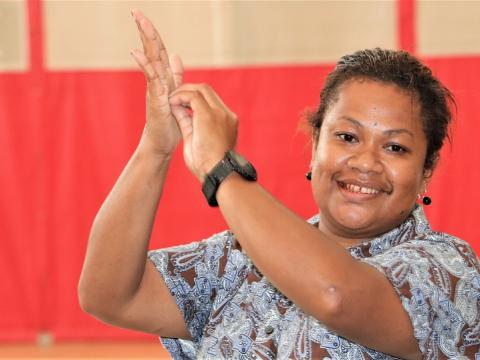Health workers receive training to curb COVID-19

“The training has helped us understand better how to keep ourselves safe and protected," says Regina.
Regina is a Health Extension Officer (HEO) and is the manageress at Lawes Road Clinic in Port Moresby.
She was one of the health workers in Port Moresby who attended a two-day COVID-19 preparedness workshop conducted by Médecins San Frontieres (MSF) with support from World Vision and the National Capital District Provincial Health Authority in Papua New Guinea.

During the two-day workshop, health workers learned briefly about COVID-19 and its possible control measures in preparation for an unexpected onset or influx of cases of the pandemic on Papua New Guinea shores.
The World Health Organisation (WHO) has warned about a second wave of the pandemic. Hence, our front-liners must know how to protect themselves while treating those infected and seeking treatment at clinics, hospitals or isolation centres.
In the workshop, participants learned about the necessary steps and the importance of proper hand hygiene. They also learned about the correct procedures of putting on and removing personal protective equipment (PPE), so they remain protected and reduce their chances of contracting COVID in an emergency or at an isolation centre.
According to WHO, Infection Prevention and Control (IPC) has now become a ’new normal’ WHO guideline applicable for any country and suitable for local adaptations.
The IPC takes into account the strength of available scientific evidence, the cost and resource implications, and patient values and preferences.

Acquiring the knowledge and basic skills on IPC is vital as it is estimated by WHO that 7 per cent of patients in developed and 10 per cent in developing countries will acquire at least one Health Care-Associated Infection (HAI). The HAI is one of the most common events in care delivery and a major public health problem with an impact on illness, death and quality of life.
These infections also present a significant economic burden at the societal level. However, a large percentage are preventable through effective IPC measures.
Regina says, “I’m grateful for this partnership and also to World Vision for supporting this training." She added that having such skills will benefit health workers like herself because then they will know how to protect themselves while working with coronavirus patients.
As of May 31, COVID-19’s death toll worldwide estimated at more than 360,000 cases and counting. Papua New Guinea has had only had 8 cases with mild symptoms and zero deaths. People should not be complacent but must continue to be in preparedness and responsive mode.